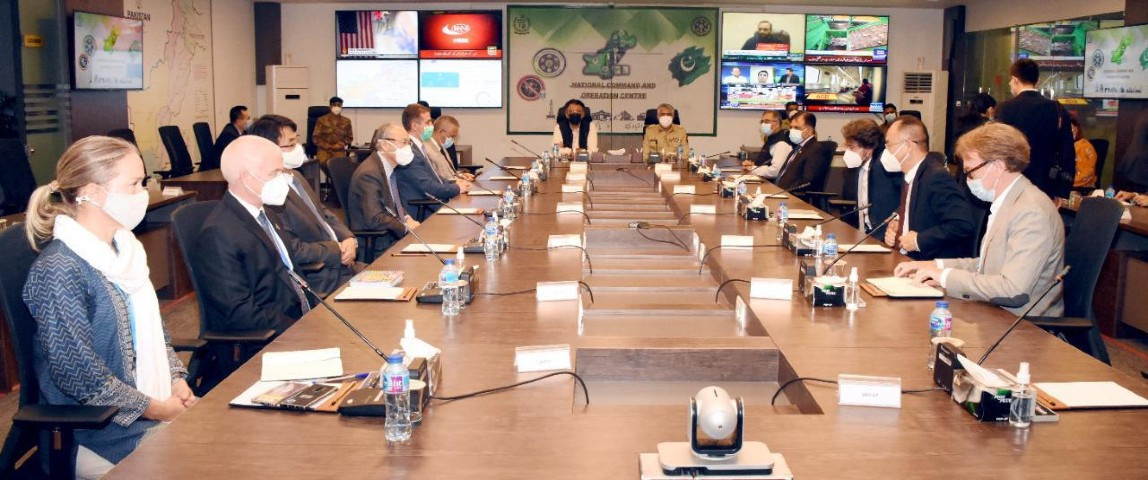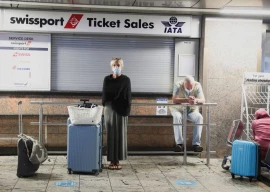
The National Command and Operations Centre (NCOC) warned on Monday that new variant of coronavirus, Omicron, was wreaking havoc worldwide, particularly Europe, and eventually would also affect Pakistan.
Addressing a joint press conference with Special Assistant to Prime Minister on Health Dr Faisal Sultan, NCOC chief Asad Umar said that the country had a few weeks to counter the threat posed by Omicron, which was first detected in the southern African region.
“Omicron, is wreaking havoc across the world [and it] will also eventually affect Pakistan as well, but the country has a few weeks to counter the threat,” Umar said. “The variant has spread across the world and it will be impossible to stop it from entering Pakistan because the world is so inter-connected.”
Umar, also the planning minister, urged the people to complete their vaccination doses in the wake of the “very dangerous” variant. “The logical solution to thwart the new variant is full vaccination,” the minister told the press conference.
Citing the example of South Africa, where the positivity rate rose from 0.9% to 9.77% in mere 12 days, the NCOC chief repeated his call for vaccinating people aged 12 and above, and warned that after “the emergence of Omicron, there won’t be much time to tackle” the pandemic.
Detailing the measures to counter the threat of Omicron, the minister said that the government had already banned flights from countries that were under the Omicron onslaught, while it would ramp up testing in high-risk areas and revive the contact tracing system.
“All such steps can [only] delay the arrival of the new variant in Pakistan, but it is impossible to stop it from coming here because the world is so inter-connected. This is a very dangerous variant, but vaccination will still be effective against it,” he added, citing the initial report regarding the new variant.
He noted that a big vaccination campaign was being started in the provinces in the next two to three days. “The country has two to three weeks to vaccinate the people. Provinces have been urged to step up the vaccination, as the vaccinated population will be able to mitigate the effects of the virus.”
Read Explainer: How worried should we be about the Omicron variant?
Speaking on the occasion, Dr Sultan said that the majority of the people, who were hospitalised or died in the European countries because of the coronavirus had not been fully vaccinated. He stressed the need for continuing the practice of social distancing.
“Omicron variant is a cause of concern because it is spreading at a rapid pace. This will strain the healthcare system, resulting in a shortage of beds and oxygen,” Dr Sultan warned. As per initial scientific reports, he said, the variant was mutated to possibly a deadlier virus.
“As it’s impossible to stop the virus from entering Pakistan, it is imperative to get fully vaccinated at the earliest,” he said, adding that an increase in the vaccination rate would mitigate the effects of the Omicron variant.
World shuts door
South African scientists announced the discovery of Omicron variant on November 25. With multiple mutations, the variant is thought to be highly contagious, while many countries raced to try and contain it, banning flights from southern Africa.
On Saturday, the NCOC banned the entry of travellers from South Africa, Mozambique, Namibia, Lesotho, Eswatini, Botswana and Hong Kong, after the emergence of Omicron Corona variant of Covid-19 in South Africa and its spread to adjoining regions.
Taking an act-now-ask-questions-later approach, several countries around the world also slammed their doors shut again to try to keep omicron at bay as more cases of the mutant coronavirus emerged and scientists raced to figure out just how dangerous it might be.
The World Health Organization (WHO) said on Monday the Omicron variant carried a very high risk of infection surges, reviving worries about the economic recovery from the two-year pandemic. The WHO, however, noted that so far no death had been linked to the new variant.
Read more No evidence on higher transmissibility of Omicron variant: WHO
An infectious disease expert from South Africa, where scientists first identified Omicron last week, said it was too early to say whether symptoms were more severe than previous variants, but it did appear to be more transmissible.
Prof Salim Abdool Karim also said existing Covid-19 vaccines were probably effective at stopping Omicron from causing severe illness. Scientists have said it could take weeks to understand the severity of Omicron.
Several countries imposed travel and other restrictions, worried that Omicron could spread fast even among people with immunity from vaccination or prior infection. Travellers stranded at Johannesburg international airport said they felt “helpless” as flights from South Africa were cancelled.
Portugal found 13 cases of the variant at a Lisbon football club. Scotland and Austria also reported their first cases. Japan described its ban on arrivals by foreigners as precautionary. In Israel, a ban on arrivals by foreigners took effect overnight.
But South African President Cyril Ramaphosa denounced “unjustified and unscientific” travel bans that damage tourism-reliant economies. His country has said it is being punished for its scientific ability to detect new variants.
After a virtual meeting on Monday, G7 health ministers praised South Africa for its “exemplary work” in detecting the variant and alerting others to it. UN Secretary-General Antonio Guterres expressed concern that travel restrictions would leave southern African countries isolated.
Omicron has an unprecedented number of spike mutations, some of which are concerning for their potential impact on the trajectory of the pandemic. More than 261 million people in over 210 countries have been reported to be infected by the coronavirus since the first cases were identified in China in December 2019 and 5,456,515 have died, according to a Reuters tally.
(WITH INPUT FROM REUTERS)


1725612926-0/Tribune-Pic-(8)1725612926-0-165x106.webp)



















COMMENTS
Comments are moderated and generally will be posted if they are on-topic and not abusive.
For more information, please see our Comments FAQ